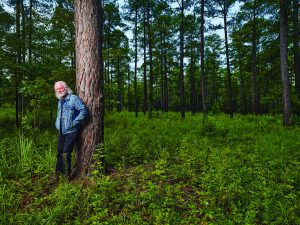
CHUCK LEAVELL MADE HIS NAME playing the piano, first in the 1970s for the Allman Brothers Band and Sea Level, and, for the last four decades, with the Rolling Stones. Along the way, the legendary keyboardist has developed a meaningful new connection to this wooden instrument by devoting his life to tree farming and sustainable forestry.
“It’s all my wife’s fault,” says Leavell, referring to his partner of 51 years, Rose Lane. In 1981, Rose Lane’s grandmother died, leaving her and Leavell 1,200 acres of ancestral Twiggs County farmland, just outside of Macon. There were cows, cotton, soybeans, corn, and vast amounts of timber. “I stopped to think about a tree,” he says. “The wood from this thing has given me so much in my life. Caring for it seemed like a way of celebrating and
giving back to the resource.” Leavell checked out books on land use from the library, picked up brochures from the Natural Resources Conservation Service, and even took a correspondence course on forestry while on tour. He and Rose Lane built the land into 4,000 acres of timber farm called Charlane Woodlands and Preserve. They became outspoken advocates for woodland conservation, and their stewardship of Charlane has brought recognition from many conservation groups, including the title of honorary forest ranger Leavell earned from the U.S. Forest Service. He has also published numerous books on forestry, been featured in a documentary, Chuck Leavell: The Tree Man, and currently hosts the PBS television show America’s Forests with Chuck Leavell.

Ever the artist, Leavell is passionate about the aesthetic of the woods and the peace and inspiration that comes from a woodland stroll. But he’s equally ardent about the practical side of sustainable tree farming. “We want to set aside lands that aren’t used for production, but I live in a wooden house,” he says, acknowledging that wood is needed for “our homes and schools, paper for our books and magazines, and cardboard for our Amazon boxes.” And what do his rock star colleagues think of this offstage obsession? “Initially, there was a lot of head-scratching, like ‘What the hell is Chuck talking about?,’” says Leavell, adding that over time, the people he works with have developed an appreciation for this kind of conservation effort.
This article appears in the Fall 2024 issue of GaBiz
Advertisement




